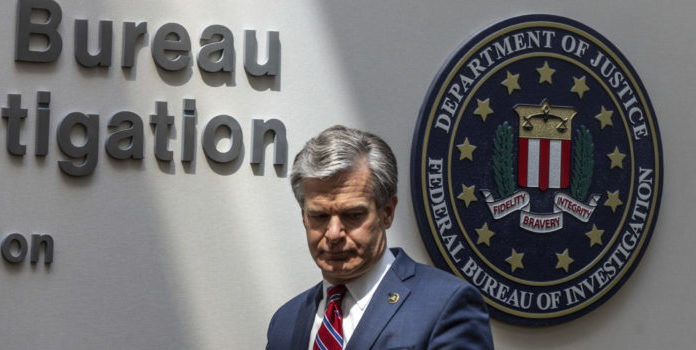(Ken Silva, Headline USA) The FBI’s improper surveillance of an unnamed U.S. congressman has been revealed in a recently released government audit, which looks at how federal agencies use and abuse their access to information collected under Section 702 of the Foreign Intelligence Surveillance Act.
FISA’s Section 702 allows the U.S. government to target foreigners outside the U.S. for intelligence purposes. This often results in the collection of Americans’ communications.
The law also allows intelligence agencies to search through the Section 702 data they collect—including information relating to Americans—if doing so is “reasonably likely” to return foreign intelligence information or evidence of a crime.
But the recently released audit, conducted by DOJ and Office of the Director of National Intelligence officials, found that the FBI abused this process.
For example, “In one query incident, FBI queried the names of a local political party to determine if the party had connections to foreign intelligence. This query was not reasonably likely to retrieve foreign intelligence information,” said the audit, which covers the period from Dec. 1, 2019, to May 31, 2020.
Perhaps the most prominent example of abuse cited in the report is the FBI’s surveillance of an unnamed “U.S. congressman.” According to the audit, an intelligence analyst conducted multiple queries—the exact number is redacted—using the congressman’s name.
The report further says that the analyst opened “Section 702-acquired products”—in other words, communication records—but did not use or disseminate them.
“[The attorney general] and ODNI assess, based on these facts, that these queries were not compliant because they were overly broad as constructed (i.e., queried the U.S. congressman’ s name with no limiters),” the report said.
In yet another instance, auditors found that the FBI conducted a number of improper 702 queries after receiving a dubious report about two people of Middle Eastern descent.
“An FBI analyst conducted queries related to an assessment opened based on a witness’s report that a vehicle driven by an individual of Middle Eastern descent sped into the parking lot and began honking the horn. A second individual of Middle Eastern descent came out of the apartment complex, and the individuals began loading boxes into a second vehicle,” the report said.
“The witness reported that some of the boxes were labeled ‘Drano,’ and that there were also ‘white containers which appeared to be upside down with black screw tops in the box.’
The report said these facts were insufficient for the FBI to launch an assessment, and therefore the queries were improper.
The audit determined that the FBI’s errors were due to “misunderstandings,” and said the bureau has approved in this area markedly in recent years.
“Misunderstandings regarding FBI’s systems and FBI’s querying procedures caused a large number of query errors. In particular, a single multifactor query at one field office accounted for a significant number of compliance incidents during this reporting period,” the report said.
“Even so, the numbers of FBI query errors, and FBI compliance incidents overall, reported during this reporting period were significantly lower than they have been in the past few reporting periods.”
An FBI spokesperson also reportedly told tech publication Wired that the issues described by the report pre-date FBI reforms.
However, a report last year from the Office of the Director of National Intelligence revealed that the number of searches conducted by the FBI of Americans’ communications doubled from 2020 to 2021.
According to the report, the FBI used its Section 702 powers to collect the data of roughly 3.4 million U.S. people in 2021—up from 1.3 million a year before. The report only provides statistics for 2020 and 2021.
Senior Biden administration officials reportedly attributed the uptick in FBI searches to Russian cyberattacks throughout 2021.
But privacy activists said last year’s report as well as this latest audit further demonstrate the need for FISA reform.
“There is a reason EPIC has spent years advocating for reform of Section 702 and for the end of the backdoor search loophole the FBI uses to conduct warrantless searches—these searches are ripe for abuse. The FBI has proven this over and over again,” Electronic Privacy Information Center lawyer Jeramie Scott said in a statement Friday
“These latest revelations are only the latest in a string of improper FBI searches that violate Americans’ privacy. Congress must enact serious reform of Section 702 or let the authority expire.”
As Scott referenced, Section 702 expires at the end of the year unless reauthorized by Congress.
A number of Republicans have expressed opposition to renewal, including House Judiciary Committee Chair Jim Jordan, R-Ohio.
Ken Silva is a staff writer at Headline USA. Follow him at twitter.com/jd_cashless.

